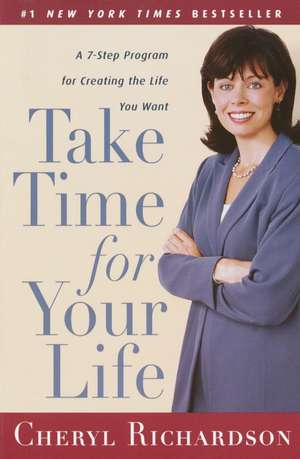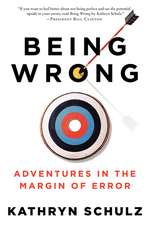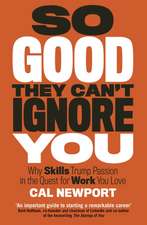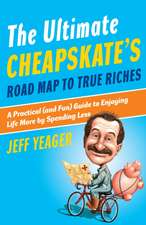Take Time for Your Life: A Personal Coach's Seven-Step Program for Creating the Life You Want
Autor Cheryl Richardsonen Limba Engleză Paperback – 30 noi 1999
Step 1: If you think "selfish" is a dirty word, learn to practice extreme self-care--put yourself at the top of the list and everyone else will benefit!
Step 2: If your schedule doesn't reflect your priorities, stop reacting to life and take control of what gets your time and attention.
Step 3: Identify the things that drain you and eliminate them--people, places, and things--once and for all.
Step 4: If you feel trapped by money, investing in your financial health will stop making you feel like a victim.
Step 5: Kick the adrenaline habit! Identify the things that fuel you and discover healthy, new sources of energy.
Step 6: If you feel lonely or isolated, learn how to surround yourself with high-quality relationships that support, challenge, and encourage you to be your best.
Step 7: Don't let life get in the way of your spiritual well-being--connect to your inner wisdom and create a personal practice.
Packed with useful exercises, checklists, personal stories, and a wealth of resources, Cheryl Richardson's program will show you how to step back, regain control, and make conscious decisions about the future you'd like to create. Take time for your life--and begin living a life that you love.
Preț: 89.29 lei
Nou
17.09€ • 17.84$ • 14.14£
Carte disponibilă
Livrare economică 14-28 martie
Specificații
ISBN-10: 0767902076
Pagini: 272
Dimensiuni: 132 x 203 x 15 mm
Greutate: 0.3 kg
Ediția:TRADE PBK.
Editura: BROADWAY BOOKS
Extras
Would you like to change your life? Do you long for a sense of community? More time for yourself? Would you like to take better care of your health, reduce stress, and create more balance in your life? Well, you're not alone. More and more people are tired of the fast-paced, frenzied "information age" and are interested in higher-quality lives--lives in which they have more time for themselves and their relationships, more energy to invest in their emotional, physical, and spiritual well-being.
Whether you're a corporate executive working sixty hours a week, a single parent trying to raise a family, or someone who's tired of feeling stressed out and pressed for time, you have a choice about how to live your life. You can step back, reevaluate your priorities, and make a conscious decision about the future you'd like to create. How do you make such a decision? Where do you turn when you decide to improve the quality of your life?
When your body is out of shape and you need help getting fit or losing weight, you hire a personal trainer. Wouldn't it be great if you could do this for all other parts of your life? Well, now you can. With the help of a "personal coach," you can shape up your life and overcome the obstacles that get in the way of living a life that you love. In a sense, you can hire a "personal trainer for your soul."
When people hear that I'm a coach, the first question they inevitably ask is: "What sport?" Once I tell them that I'm not an athletic coach and that I coach people to create lives that they love, they wonder how coaching is different from therapy. It's understandable that most people would confuse the two--therapy is the closest model we have to this new profession called coaching. But the two are very different.
Coaching is not about processing your emotional history or diagnosing and treating mental health issues. Coaching is action oriented, with a focus on a client's current life and plans for the future; although therapy deals with a client's current life, the focus is usually on the past and the healing of emotional wounds. There can be overlap between coaching and therapy, and a well-trained, experienced coach should know when a client needs therapy instead of coaching. Because of this, I've developed relationships with experienced, licensed professionals, and it's not uncommon for us to refer clients to each other.
There is a growing need for more than what therapy provides. In therapy, clients may talk about the changes they'd like to make in their lives, but the "how to" and the resources are often missing. Yet such information is critical to my clients' success. Clients want someone to help them design a new life. They want a guide who can anticipate the obstacles on the path to this new life and help navigate around them. They want a partner who will remind them of their greatness when they forget, give them the tools to get unstuck, and challenge them to take action in spite of their fears. This need is now being met by personal coaches.
The need for coaching became evident to me while I was working as a tax consultant more than fifteen years ago. The time spent with clients was often very personal, requiring an intimate look into their lives. Typically, we'd talk not only about their finances (income, spending habits, and debt) but also about their medical history, family goals, and career plans. The questions they asked often concerned decisions that needed to be made about relocation, relationship conflicts, business dilemmas, or the challenge of balancing work and family. This led to longer conversations about life in general.
Although tax consulting can be a straightforward, "just the facts, ma'am," kind of job, my practice developed in a different direction. Year after year, in addition to their tax folders, clients brought me their life stories, wanting my advice and support. They needed a sounding board, an objective listener who could provide a fresh perspective. I learned how to create an environment in which people could feel comfortable and safe enough to talk about their lives freely.
In private, they would share with me their fears and concerns. Business owners, afraid of losing clients if they raised their fees, would let their own well-being suffer instead. Corporate employees, needing to support their families, struggled with how to handle political issues at work or the insensitivity of bosses.
Together we found solutions to the problems that were causing them stress. Sometimes, simply hearing an objective perspective would make all the difference in the world. Other times, finding the right language to communicate their needs allowed them to get unstuck and take action. Most important, knowing that they were not alone and that others grappled with the same kind of issues provided them with comfort and much needed support.
Over time I became less interested in preparing people's tax returns and more interested in helping them prioritize their lives to spend more time with their families or fulfill a secret dream, like starting a business or having a child. I decided to stop providing my tax consulting services and start responding full-time to the greater concerns of my clients. I began to do this by holding workshops called "Secrets of Success" and speaking to groups about everything from goal setting to relationship-building strategies. People were relieved to find someone who could help them overcome obstacles to better their lives. One thing was clear--there was a need for "life planning" but there was no one to turn to. This need for objective guidance and support has spawned the profession of coaching.
Many people from all walks of life are turning to coaches to help them build better lives. The reasons may vary, but the bottom line is always the same--they want to improve the quality of their lives in some way. My client Shirley is a good example.
Shirley is the vice president of sales for a fast-growing biotech company. By most standards, she has reached a considerable level of success--she earns six figures, shares a beautiful lakeside home with her husband, and is a recognized leader in her field. But Shirley doesn't feel successful; she feels exhausted. Her day begins at 6 A.M. with a trip to the gym and continues nonstop until 8 or 9 at night. Most days--among the endless meetings, phone calls, and social engagements--she finds herself dreaming of a different life, a life that includes more time for herself, less stress, and a chance to express her creativity. Shirley's tired of living her best life in her head.
My client Joseph is a corporate employee who's already been the victim of downsizing and is afraid that he's headed in the same direction again. Joseph goes to work every day filled with anxiety, fearful that each day may be his last. After giving ten good years to his employer, an architectural firm, he knows that the marketplace has changed, and the company is now involved in restructuring. With mounting debt and one child headed for college, Joseph can't afford to miss a day of work, let alone lose his job.
And then there's my client Norman, the owner of a successful financial investment firm. Norman travels at least twice a month to visit clients scattered throughout the country. He has eight sales associates who call him at all hours of the day and night and a fiancée who complains that they never spend quality time together. Norman feels like life is rushing by at lightning speed, and he's starting to get nervous. He jokingly admits that he needs to stop and get a life, but he can't seem to slow down.
Joseph, Shirley, and Norman are caught in a trap. Each has come up against the kind of obstacles that prevent most people from taking control of their lives. For example, Shirley has no time for her life and feels frustrated by all the demands placed on her. She struggles to carve out time for the things she really wants to do--like taking a class and working in her garden. What's stopping her is an inability to put herself first. Shirley needs permission to make her self-care a top priority over anything else.
Joseph, on the other hand, appears to need another job, fast, but a new job is only part of the solution. The source of Joseph's problem is his vulnerable financial state. His credit card balances are maxed out, his mortgage is too high, and his family spends more than they make. To truly be in charge of his career, Joseph needs to invest in his financial health.
As for Norman, he may need to learn new skills to manage his employees better, but the first order of business is for him to manage himself. He's running on adrenaline and must learn how to slow down and use healthier sources of fuel.
As a personal coach, it's my job to listen carefully, beneath the symptoms of a situation, for the source of the problem. If you're feeling exhausted, a better diet or exercise program will certainly help, but you may first need to identify and eliminate what's draining you. Or, if you're constantly undermined by people who criticize you or put you down, setting boundaries can make a difference, but sometimes you need to trade in those unsupportive relationships for more life-enhancing ones. If work has taken over your life, finding a way to manage your time won't solve the problem. Instead, you'll need to manage yourself, get your priorities straight, and focus your attention on what really matters. Most important, if you long to live a more authentic life, one that reflects your values and desires, then you must give your spiritual well-being a more prominent place in your daily life.
Over the last fifteen years I've coached hundreds of clients who have wanted to significantly change their lives. During weekly telephone meetings, I listen carefully as clients talk about what they want and don't want in their lives. Over time, I've identified seven common obstacles that consistently prevent people from living lives that they love:
You think "selfish" is a dirty word. You have a hard time putting your needs before others and often end up feeling frustrated and resentful about the commitments you make.
Your schedule does not reflect your priorities. You find yourself exhausted at the end of the day without enough time left for the things that are most important to you.
You feel drained by people, places, and things. Your life feels like one long list of things to do that never seem to get completed. Your office still needs organizing, your home may be full of clutter, or you may feel drained by a friend or family member's constant complaints.
You feel trapped by money. You're tired of not being able to make the choices you want because of financial constraints. You may be saddled with unwanted debt, struggling to make ends meet, or feeling unsatisfied with the way you spend your money.
Adrenaline has become your main source of fuel. You're constantly running from one appointment to the next. You'd like to relax but you can't seem to slow down. Peace of mind seems like an impossible goal.
You're missing a supportive community in your life. You feel isolated or disconnected from others and long to share a deeper connection with a community of like-minded people.
Your spiritual well-being gets last place in your busy life. You'd like to spend consistent time in meditation, prayer, practicing yoga, or other forms of spiritual self-care, but life keeps getting in the way.
These are the seven blocks that, when given time and attention, can easily be turned around. Overcoming these obstacles is the focus of this book. If you're willing to work hard and invest your time (which this book will help you find!) and energy in this process, I promise you, your life will change dramatically. You can make the shift and put yourself in charge of how you live your life.
You can live a life you love, and I'd like to show you how.
Notă biografică
Recenzii
--James O'Shaughnessy, author of How to Retire Rich
"Cheryl Richardson is a wise and loving woman. Her advice is as excellent as it is fun to read."
--Marianne Williamson, author of A Return to Love
Textul de pe ultima copertă
STEP 1: If you think "selfish" is a dirty word, learn to practice extreme self-care -- put yourself at the top of the list and everyone else will benefit!
STEP 2: If your schedule doesn't reflect your priorities, stop reacting to life and take control of what gets your time and attention.
STEP 3: Identify the things that drain you and eliminate them -- people, places, and things -- once and for all.
STEP 4: If you feel trapped by money, investing in your financial health will stop making you feel like a victim.
STEP 5: Kick the adrenaline habit! Identify the things that fuel you and discover healthy, new sources of energy.
STEP 6: If you feel lonely or isolated, learn how to surround yourself with high-quality relationships that support, challenge, and encourage you to be your best.
STEP 7: Don't let life get in the way of your spiritual well-being -- connect to your inner wisdom and create a personal practice.
Packed with useful exercises, checklists, personal stories, and a wealth of resources, Cheryl Richardson's program will show you how to step back, regain control, and make conscious decisions about the future you'd like to create. Take time for your life -- and begin living a life that you love.

















